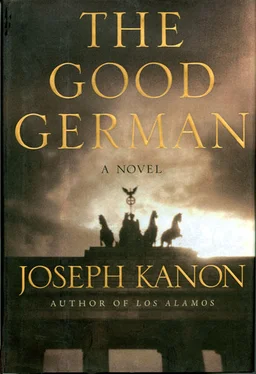“Respectable, like.”
“Yes.”
“Well, it’s your lookout. Smoke?” He opened a gold cigarette case, a prop from Private Lives. “Take my advice, don’t do it. You don t want to settle in, makes it worse after. Me, I like a choice.”
“I appreciate this,” Jake said, ignoring him. He took out some money. “Do you want something down?”
Danny looked away, embarrassed again by actual cash. “You’re good for it, aren’t you? Friend of Gunther’s.” He turned and pulled out a chair. “Here, have a drink. Come on, Gunther, share and share alike. Pour out, pour out.”
“That’s all right,” Jake said. “I’ve got somebody waiting.” He nodded at the bottle. “Looks like I’d have a lot of catching up to do. You been here all day?” he said to Gunther.
“No,” Gunther said calmly, “working for you.” Looking at him steadily, so that Jake understood the trial that morning was to be put aside, something gone with the rest of the bottle. “I spoke to Willi.”
“Let me guess,” Jake said, sitting down for a minute. “A Russian’s been paying him to watch the house.”
“Yes.”
“Find out about the one in the market? The sharpshooter?”
“I inquired, yes.”
“One of Sikorsky’s men?”
“He must have been. Vassily said he didn’t know, and Vassily knows everyone. So.” He looked up. “How did you know?”
“I talked to Shaeffer, the man who was shot. He and Sikorsky have been playing cat and mouse for a couple of weeks now. Sikorsky laid a trap and he walked right into it.”
“But the mouse got away. So. You didn’t need my services after all. What else do you know? ”
“That Tully knew where Brandt was. He didn’t just let him go, he sent him there. It was a setup. Then he collects some Russian money. They do connect. That’s what he was selling-information about Brandt.”
Gunther considered this for a moment, then picked up his drink. “Yes. It was the money that was confusing. So much. People are cheap in Berlin. You can sell them for less.”
“Not this one. He’s important. Your friend Sikorsky would be interested, for instance.”
“My friend,” he said, almost snorting. “A business acquaintance.” He smiled slightly at Jake’s expression. “Everybody does a little business.”
“The Russians must have Emil. You thought so this morning.”
A nod. “It’s the logic. And you think Vassily would tell me? On these matters, I’m afraid, a man of principle. If he knows.”
“Then maybe he’ll tell you who drove Tully to Potsdam. I’ve been thinking about that. How did he get there?”
“The general is not a chauffeur, Herr Geismar.”
“Somebody met Tully at the airport. Somebody drove him to Potsdam and killed him. It had to be a Russian.”
“The same man?”
“What do you mean?”
“Would you spend all day with someone you intended to kill? What would you do with him all day? No, you would do it.” He made a chopping motion with the side of his hand.
“He’s got you there, mate,” Danny said, surprising Jake, who’d forgotten he was at the table.
“But the driver, anyway,” Jake said, annoyed at being interrupted, “he’d be Russian. Why not ask?”
“Because you would learn nothing,” Gunther said, serious. “Nothing. And you would make yourself-conspicuous. Never be conspicuous with the Russians. Not a patient people. They strike.” He lifted a finger for emphasis. “Keep your head down until you know. Be a policeman, follow the numbers.”
“This is where they lead.”
Gunther shrugged. “The airport, yes, that’s interesting. The driver, what would that tell me? Unless it’s the same man-but how could that be?” He shook his head. “It’s the wrong question. Besides, you know, I have my interests to protect.”
“Yeah. Everybody does a little business.”
Gunther took a drink, looking down into the glass. “You forget, I’m a friend to the Soviet peoples.” The accented German of the prosecutor, bitter, the trial still there after all. “Who knows?” he said, almost airy now, playing with it. “Maybe soon an employee. The general admires my work. There are not so many opportunities.”
“You’d work for him?” Jake said, thrown by this. “You’d work for the Russians?”
“My friend, what difference does it make? When you leave, who will be here? We have to live. Calm yourself,” he said, waving his hand, “for now it’s not attractive. I’m working on a case.” He raised his glass, a reassuring toast.
“You see?” Danny said. “That’s what he likes. Old Sherlock. It’s not the money with him.”
“Then I’ll try to keep you interested,” Jake said, getting up. He looked down at Gunther, placidly draining his glass. “That’s quite a future you have in mind, you and Vassily. You know, he was in the market when Shaeffer got hit. I guess that would make him the greifer.”
Gunther lowered the glass, drawn by the word. His face was slack, eyes lost and empty like one of the children on the platform. He looked at Jake for a moment, then grunted, slowly moving the glass aside, pushing it out of sight with everything else. “Be careful he doesn’t become yours,” he said, his voice composed, neutral.
“But—” Jake said, then stopped.
“But you have someone waiting,” Gunther said. “The other matter we discussed-the living arrangements?”
“It’s taken care of,” Jake said, deliberately not looking at Danny.
“Good. Sometimes it’s enough, just moving.” He looked down. “Of course, not always.”
Outside, the street was full of drivers, bored privates in khaki standing by while their officers danced. The GI on guard duty was talking to Lena, leaning casually against the jeep.
“He says he knows Texas,” she said, smiling as Jake approached. “There are hills there, so that’s good.”
It took Jake a second, preoccupied, to realize she was back with the children.
“That’s right, lots of hills,” the soldier said in a cowpoke drawl. Any driver, maybe even him, pulled out of the pool to escort the visitor around.
“They’ll like that,” she said as Jake started the motor. “Like home.” Rolling Silesian hills.
“Let’s hope so.”
“What were you doing?”
“Seeing a man about a place. We can have it tomorrow.” He swung into the street.
“So soon.”
“Why not? There’s not much to pack.”
“Oh, it’s easy for you. That’s how you live. A gypsy,” she said, but smiling.
“Well, I’m used to it,” he said. Tents and hotels and rented rooms.
“No, you like it.”
He glanced over at her. “Will you?”
“Of course,” she said, a forced brightness. “We’ll be gypsies. One suitcase. You don’t think I can do it?”
He smiled. “Well, maybe two cases.”
There was no one in the street outside the flat, still safe, and no one inside either, Hannelore’s party, as expected, running late.
“I have to wash,” she said. “I won’t be long. Look at the mess she’s left. Well, I won’t miss that.”
“I’ll clean it up.”
“No, in the morning. It’s so late. Am I standing up?”
But when the bathroom door closed, he went over to the sink anyway, thinking of when she’d been sick, washing the dishes to fill the time, waiting for the doctor, tidying up as a kind of medicine. Only three weeks ago. There wasn’t much to do-cups, some scattered papers near the typewriter. Most of his clothes were at Gelferstrasse. Not even one suitcase. It would take only minutes to leave, another room. And yet it occurred to him that Frau Hinkel was wrong-he was home here, all the years before the war, then these last weeks when it seemed a kind of sanctuary, here longer than anywhere he’d ever been. His place. Nothing remarkable-the rumpled sofa where Hal used to pass out, the table where Lena had sat with coffee, sunlight pouring across her robe; his private piece of Berlin. But not a refuge anymore, a trap.
Читать дальше












